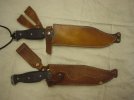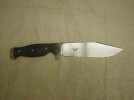- Joined
- Dec 5, 2005
- Messages
- 27,801
I'm putting this question out there, as the topic has arisen amongst other threads, all on its own because I think it's integral to the acquisition of handmade/custom knives.
Most of us probably buy handmade/custom knives partly because of trust; we trust in the integrity of the blade due to the extra care taken by the maker, we trust in the longevity of the 'value' of the knife, and we trust in the materials selected and that they are what the maker says they are. Trust is a word that often pops up when we talk custom/handmade knives.
Many makers stamp or otherwise mark their blades with the material used, and/or provide a certificate of authenticity. Some may even go so far as to include a copy of their receipt from their supplier showing the materials as they purchased them.
So this question is mostly for makers.
How do you ensure that your customers have complete faith in the fact that they are getting what you tell them you're getting? How do you have complete faith in your suppliers?
Most of us probably buy handmade/custom knives partly because of trust; we trust in the integrity of the blade due to the extra care taken by the maker, we trust in the longevity of the 'value' of the knife, and we trust in the materials selected and that they are what the maker says they are. Trust is a word that often pops up when we talk custom/handmade knives.
Many makers stamp or otherwise mark their blades with the material used, and/or provide a certificate of authenticity. Some may even go so far as to include a copy of their receipt from their supplier showing the materials as they purchased them.
So this question is mostly for makers.
How do you ensure that your customers have complete faith in the fact that they are getting what you tell them you're getting? How do you have complete faith in your suppliers?






